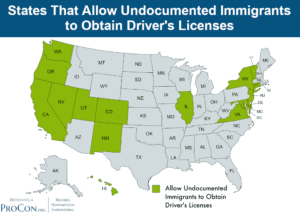Driver’s Licenses are available for Undocumented Residents in the United States
|
|

This post was originally published December 17th, 2021. The format and/or content has been updated for quality assurance.
Traffic court can result in a question of citizenship for individuals that don’t have a driver’s license, especially if they happen to be latino. This is a hardship on the Latino community in much the same way that “stop and frisk” has been on African American communities. This hardship is perpetuated by using the term “illegal” for individuals that are innocent until proven guilty under U.S. law.
Under the U.S. Constitution, States are allowed to have different requirements for issuing a driver’s license. Most states require a social security number to get a driver’s license, but not all states do. There are many states that have alternatives to providing a social security number when getting a driver’s license. These states typically allow one to get a driver’s license if they provide a statement from the Social Security Administration that they are “ineligible for a social security card”. This requires admitting that you don’t have a birth certificate or other documentation proving you are a U.S. citizen, but the Social Security Administration does provide this statement for tax payers.
Sixteen States and the District of Columbia have enacted laws specifically to allow individuals without a social security number to obtain driver’s licenses. These states are California, Colorado, Connecticut, Delaware, Hawaii, Illinois, Maryland, Nevada, New Jersey, New Mexico, New York, Oregon, Utah, Vermont, Virginia and Washington. Ohio isn’t on this list, so a resident of the Greater Cincinnati Area who doesn’t have a Social Security number would need to travel to one of these States to get a driver’s license for use in Ohio. Illinois, Virginia, Maryland, and New York are the closest. Details of the requirements to get a driver’s license in these States can be found online in several places, including the licensing bureaus of each of those States.
The most “open” State, in terms of allowing alternative forms of identification to obtain a driver’s license, is Nevada. They allow applicants, regardless of legal status, to provide birth certificates or passports issued by a foreign country as proof of identity. This law also prohibits the release of information relating to legal status for purposes relating to the enforcement of immigration laws. New York State also restricts what information can be retained and given out on those applying for a driver’s license.
The illegality of someone residing in the U.S. is a matter of law, not public opinion. As such someone uncharged by the court is properly identified as “undocumented”. That is, they are not carrying their birth certificate on them, or other form of proof that they are a U.S. citizen or approved visitor. Such a person is not “illegal” until a U.S. Court finds them guilty of breaking our residency laws.
You can find more resources related to IDs and citizenship by selecting the “IDs & Citizenship” category tab on our “Social Service Utilization Library” page.

Tags: Archive

